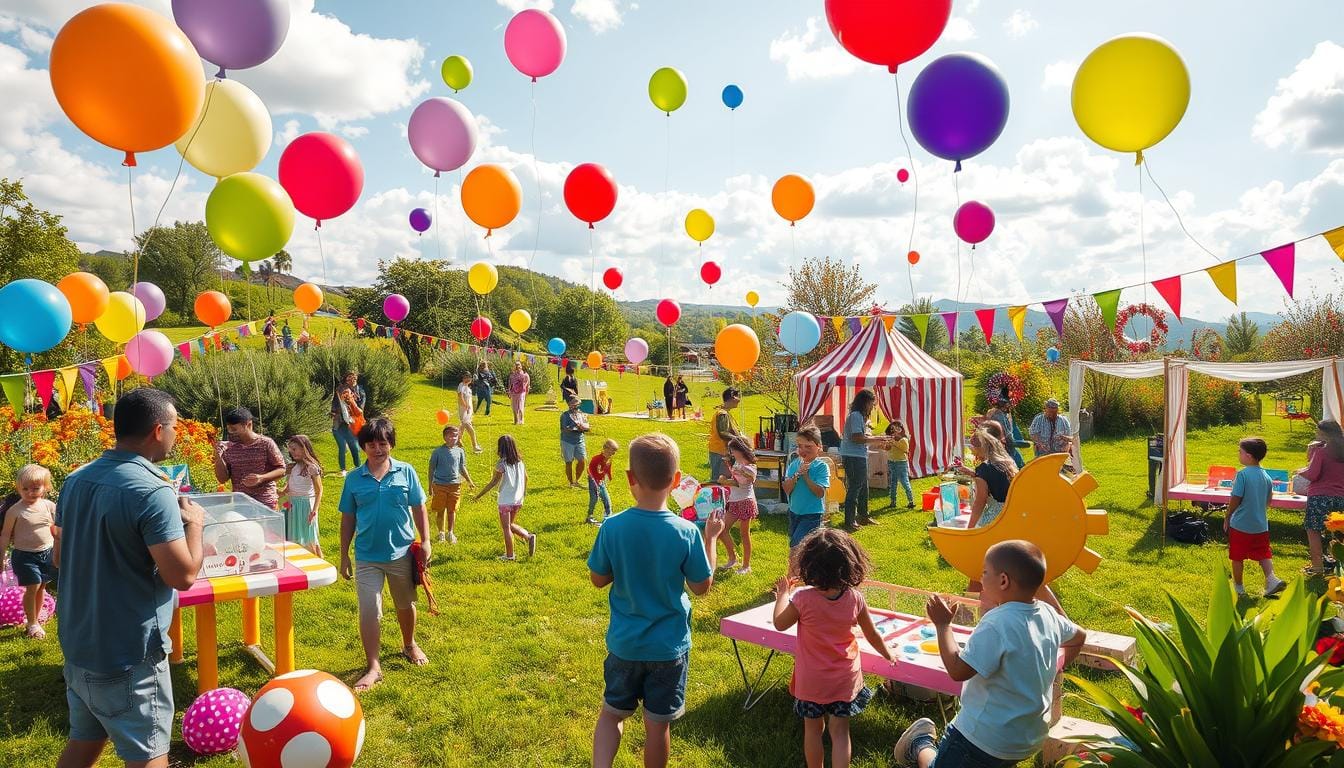Ever wondered how to be the center of attention? The person everyone wants to be around, eager to hear your stories and laugh with you? As an Enneagram 3, you’re used to making New Year’s resolutions and improving yourself. This year, why not aim to be more playful and fun?
Catherine Price’s book, “The Power of Fun: How to Feel Alive Again,” explores what makes life fun. She says true fun isn’t just about exciting moments. It’s about being playful, connected, and fully present. By breaking free from our daily routines, we can create unforgettable moments for ourselves and others.
Becoming fun isn’t about pretending or always looking for thrills. It’s about having a positive outlook, being social, and being spontaneous. It’s about finding joy in everyday things, like walking outside or being thankful, and sharing those moments with others. With practice and a bit of courage, you can become a more playful and engaging person.
Table of Contents
Understanding What Makes Someone Fun to Be Around
To truly appreciate a fun person, we need to understand their psychology. Fun individuals balance openness, emotional intelligence, and the ability to create positive experiences. This makes them enjoyable to be around.
Common Traits of Fun People
Fun people have unique traits that make them stand out. They are adaptable and love spontaneity, bringing new experiences into their lives. They are also adventurous, stepping out of their comfort zones to try new things.
Most importantly, they know how to make others laugh. This talent in cultivating humor makes social interactions more enjoyable.
The Impact of Fun Personalities on Social Relationships
A fun person can deeply impact social relationships. Their energy and optimism help others feel more confident and relaxed. They create a playful atmosphere where everyone feels connected and engaged.
| Trait | Percentage of Fun-Loving Individuals |
|---|---|
| Able to show their silly side without worrying about others’ opinions | 80% |
| Embrace spontaneity to bring novelty into their lives | 65% |
| Prioritize being friendly and warm to everyone they meet | 90% |
| Have strong self-worth and self-compassion | 75% |
| Are in touch with their emotions, both positive and negative | 85% |
| Practice not sweating the small stuff to maintain a positive outlook | 95% |
| Cultivate their curiosity as a fundamental trait | 80% |
| Push their comfort zones to build confidence and resilience | 70% |
The table shows key traits of fun-loving individuals. Embracing spontaneity, humor, and building confidence makes them magnetic and enriching in social settings.
“Engaging in flow-inducing activities significantly improves well-being, as shown in a study conducted in Wuhan, China.”
The psychology of fun personalities lies in creating positive experiences. By being playful and genuinely engaging, they turn ordinary moments into unforgettable ones. This leaves a lasting impact on their social relationships.
Cultivating a Positive Mindset for Personal Growth
Having a positive mindset is key for personal growth and happiness. By practicing active listening, learning storytelling, and fostering curiosity, you can change negative thoughts into positive ones. This helps you be more grateful and focus on solving problems.
Studies show that positive people are healthier. They are less likely to get sick or feel depressed. They also take care of their bodies by eating well and exercising.
Carol Dweck’s growth mindset is a powerful tool for staying positive. It believes that skills can grow with effort and learning. People with this mindset keep trying and learn new things.
Getting a growth mindset takes time and kindness to yourself. By always learning and trying new things, you can find joy and success in your own way. This makes you more resilient and open to new experiences.
Being positive is good for your brain and body. It helps you feel better and stay well. So, let positive thinking help you grow and reach your full potential.
“Optimism is the faith that leads to achievement. Nothing can be done without hope and confidence.” – Helen Keller
How to Become a Fun Person: Essential Steps
Becoming a fun person is more than just being positive. It’s about improving your social skills and being playful. Let’s look at the key steps to become a more enjoyable friend.
Developing Social Intelligence
Social intelligence is crucial for making strong connections. Start by improving your listening skills. Understand others, ask smart questions, and have real talks. Being empathetic helps too; try to see things from others’ viewpoints.
Building Confidence Through Practice
Confidence is key to being playful. Try new things like dancing or volunteering. The more you face new situations, the more confident you’ll become. This confidence lets you be more fun and engaging.
Creating Memorable Experiences
Fun people plan exciting outings. Be spontaneous and open to new adventures. Whether it’s a sudden trip or trying a new food, these moments make memories. They also make a great impression on others.
Becoming a fun person is a journey of self-discovery. By improving your social skills, gaining confidence, and making memorable moments, you’ll enjoy life more. You’ll also make a positive impact on those around you.
Mastering the Art of Storytelling and Conversation
To be fun and engaging, learning to tell stories and converse well is key. Share your own stories, be open when it feels right, and listen as much as you speak. These actions can grab your audience’s attention and build strong bonds.
Good storytellers use vivid details and timing to draw in their listeners. They know that sharing emotions and experiences is more powerful than just facts. By learning to tell engaging stories, you can learn storytelling, improve social skills, and cultivate humor in your talks.
Being a great conversationalist is also vital. Show real interest in others, ask smart questions, and keep the conversation moving. These skills make you more fun to be with and show you care about others.
“Between the Mountain and the Sky” by Maggie Doyne is a book that made the author cry multiple times, illustrating the powerful impact that storytelling can have in evoking emotion and driving positive change.
Improving your storytelling and conversation skills takes practice and courage. By working on these areas, you can become more engaging, memorable, and enjoyable to be around.

| Trait | Description |
|---|---|
| Enthusiasm | Great storytellers exude energy and passion, captivating their audience. |
| Confidence | They speak with self-assurance and poise, making the audience feel at ease. |
| Adaptability | Skilled storytellers can tailor their narratives to different audiences and contexts. |
| Creativity | They possess the ability to craft unique and engaging stories that stand out. |
| Empathy | Effective storytellers can connect with their audience on an emotional level. |
| Clarity | They communicate their ideas and narratives in a clear, concise, and compelling manner. |
By embracing these qualities and cultivating your humor, you can become a master of storytelling and conversation. You’ll captivate those around you and create deeper, more meaningful connections.
Embracing Spontaneity and Adventure
In today’s world, being spontaneous and adventurous can change your life. Embracing spontaneity means being open to new, unplanned things. It lets you stay curious and exude positive energy every day. Trying new foods, watching different movies, or exploring outdoors can spark wonder and excitement.
Breaking Out of Your Comfort Zone
To become more fun and engaging, you need to break out of your comfort zone. This could be as simple as taking a new route to work or as bold as skydiving. Studies show that new experiences and embracing spontaneity lead to growth and unforgettable moments. By focusing on one thing at a time, you can enjoy the moment more and stay curious.
Learning to Say “Yes” to New Experiences
Saying “yes” to new things is key to embracing spontaneity. It could be accepting a last-minute concert invite or trying a new hobby. Spending time in nature helps you disconnect from tech and reconnect with the world around you. This fosters curiosity and brings back a sense of wonder.
Managing Fear of the Unknown
Overcoming fear of the unknown is part of embracing spontaneity. It’s normal to feel scared when trying something new, but the right mindset can help. Creative activities like painting or writing can spark inspiration and keep you in the moment. Mindful movements like yoga or tai chi also help you stay present and embrace spontaneity in your body.
By embracing spontaneity, fostering curiosity, and exuding positive energy, you open up to new experiences and growth. So, take a deep breath, say “yes” to the unexpected, and start your adventure.
Developing Your Sense of Humor
Having a good sense of humor is key to better social interactions and overall happiness. It makes you a more fun person to be around. Learning to laugh at yourself and enjoy different types of comedy can help a lot.
Laughter releases endorphins, which make us feel good. It also makes social interactions smoother and can even help in tough situations. Plus, it boosts creativity and problem-solving skills.
To get better at humor, try these tips:
- Watch and listen to various comedy styles to understand and enjoy different types of humor.
- Use self-deprecating humor to show you can laugh at yourself and seem more witty.
- Be around people who are funny to learn how they make jokes and react to humor.
- Take humor training to improve your skills in making and enjoying jokes.
- Think about funny moments in your life to increase happiness and well-being.
Remember, humor is a skill that can be developed with practice. By cultivating humor, you can exude positive energy and improve your social skills. It also brings many health benefits.

| Type of Humor | Description |
|---|---|
| Self-deprecating Humor | Making fun of oneself in a lighthearted way, which can make one appear self-aware and witty. |
| Self-enhancing Humor | Assuming people’s unkind comments to be compliments, turning them into something positive. |
| Dry Humor | Characterized by a casual tone and a mismatch between a funny statement and deadpan delivery, making it versatile in various situations. |
| Laugh-at-life Humor | Distancing oneself emotionally from a situation and finding a lighter side or making general comments on life. |
| Dark Humor | Covering taboo topics like death and violence, but without necessarily being offensive. |
| Anecdotal Humor | Sharing amusing anecdotes from one’s life to bring joy to oneself and others. |
| Satirical Humor | Pointing out human flaws or truths through humor, often with a critical or ironic tone. |
| One-liner Humor | Succinct but not necessarily simple, consisting of witty one-liners about various topics. |
| Slapstick Humor | Making physical acts and gestures funny through exaggerated physical activity. |
“Laughter is the best medicine” – Proverb
By cultivating your sense of humor, you can exude positive energy and improve your social skills. It also brings many health benefits. So, let’s embrace laughter and become more fun to be around!
Building Strong Social Connections
Having strong social connections is key to feeling good. By listening well, making real connections, and caring about others, you can build a strong support network. This helps you feel like you belong.
Active Listening Techniques
Good communication is the base of strong relationships. Practice active listening by keeping eye contact, responding thoughtfully, and fully engaging in talks. This shows you value what the other person says, making your bond stronger.
Creating Meaningful Relationships
Building lasting relationships takes work, but it’s worth it. Invest in shared experiences and support those you care about. This mutual support boosts your social skills and confidence in connecting with others.
Being Genuinely Interested in Others
To form strong bonds, be truly interested in others’ lives. Ask deep questions, recall important details, and empathize with their stories. This not only improves your listening but also shows you care deeply about their well-being.
By using these strategies, you can build strong social connections. These connections are crucial for your happiness and overall well-being.
“Meaningful connections with others are essential for our well-being and happiness. Invest the time and effort to cultivate strong, supportive relationships in your life.”
| Benefits of Strong Social Connections | Strategies for Building Connections |
|---|---|
|
|
Incorporating Fun Activities Into Daily Life
Being spontaneous and developing playfulness can make you happier and more satisfied with life. By fostering curiosity and adding fun to your daily routine, you can live a more joyful life.
Studies show that adults who play a lot have many benefits. They become more creative, make new friends, and feel better mentally. Dr. Stuart Brown says that adult play means being open to new things, taking risks, and enjoying life more.
To be more spontaneous, try new things that interest you. You could listen to happy music, have game nights, or play with kids. Playing with kids strengthens family bonds and helps them grow.
Make your work place more fun too. Add puzzles, toys, or inspiring art to spark creativity and reduce stress. Taking breaks to play can also help you solve problems in new ways.
In short, adding fun to your life is key to a balanced life, less stress, and better health. By being spontaneous, playful, and curious, you can find more joy and energy in your life.
| Benefits of Play for Adults | Examples of Fun Activities |
|---|---|
|
|
“Play is a fundamental part of balancing our stressful lives. It is crucial for relaxation and stimulation, and benefits individuals of all ages.”
– Dr. Stuart Brown, play expert
Balancing Authenticity with Social Appeal
In today’s world, finding the right mix of authenticity and social appeal is key. As you aim to build confidence, improve social skills, and exude positive energy, it’s vital to be true to yourself. Yet, you also need to fit in with the various social scenes you find yourself in.
Staying True to Yourself
Being genuine is the foundation of real connections. Sharing your real thoughts and feelings builds trust and sincerity. A study showed that 70% of people feel more confident when they see authentic brands. Being yourself, with all your quirks, can boost your confidence and social skills.
Adapting to Different Social Situations
It’s also important to adjust to different social situations. Paying attention to social cues and understanding group dynamics helps you fit in. But, always remember to stay true to yourself and not lose your values.
Social media has made it harder to be authentic, with many people creating perfect online images. Yet, 30% of millennials have stopped following brands they see as fake. Authentic brands, like Who Gives A Crap, which donates half its profits, have earned the trust of many.
Finding the right balance between being yourself and fitting in is a challenge. But, it’s worth it. By being genuine yet adaptable, you can build confidence, improve social skills, and exude positive energy that people notice.
“Social media authenticity is emphasized as more valuable than a paid verification badge.”
Maintaining Energy and Enthusiasm
To be a fun person, you need to exude positive energy and be spontaneous. Taking care of yourself is key. Make sure to exercise regularly, sleep well, and eat healthily. Also, take short breaks to recharge.
Be playful by doing things that make you happy. This could be a hobby, a sport, or hanging out with positive people. Being around others who are full of energy can keep you feeling lively too.
“Enthusiasm is the yeast that makes your hopes rise to the stars. Enthusiasm is the sparkle in your eyes, the swing in your gait, the grip of your hand, the irresistible surge of will and energy to execute your ideas.” – Henry Ford
Remember, being enthusiastic is something you can share with others. When you’re full of energy, you inspire and motivate people. This can lead to deeper connections and more enjoyable experiences for everyone.
| Strategies for Maintaining Energy and Enthusiasm | Benefits |
|---|---|
|
|
By taking care of your energy and enthusiasm, you’ll feel more alive. You’ll also have the chance to make others feel the same way. Embrace this positive energy and see how it changes your interactions with others.
Creating Memorable Social Experiences
Making social experiences memorable is a great way to improve your social skills, foster curiosity, and embrace spontaneity. You can plan unique outings, host themed parties, or join group activities. The key is to add novelty, shared feelings, and personal growth.
Try an escape room, go to a local festival, or plan a volunteer event. These activities do more than just bring friends closer. They create lasting memories. By trying new things, you add adventure and excitement to your social life.
The main thing is to have fun and enjoy the moment. Don’t just focus on making new friends. When you’re open and ready for surprises, your friendships will be more meaningful and fulfilling.
FAQ
What are the essential steps to become a fun person?
To become a fun person, start by being a good listener and showing empathy. Building confidence is key, so try new things. Plan fun outings and be open to spontaneity to make memories.
What are the common traits of fun people?
Fun people are spontaneous, funny, and optimistic. They make others feel better by being adaptable and adventurous. They also know how to make people laugh.
How can I cultivate a positive mindset for personal growth?
To grow positively, change negative thoughts into positive ones. Practice gratitude and focus on solutions. This can include being thankful, imagining the best, and not complaining too much.
What is the psychology behind enjoyable personalities?
Enjoyable personalities are about being open, emotionally smart, and making others happy. They have a positive effect on those around them by reducing stress and boosting moods.
How can I master the art of storytelling and conversation?
To be great at storytelling and talking, share your stories and be open. Good storytellers use vivid details and keep their audience engaged. Great conversationalists listen well and ask interesting questions.
How can I embrace spontaneity and adventure?
Embracing spontaneity means being ready for anything. Try new things and say yes to new experiences. Overcoming fear helps you enjoy more adventures.
How can I develop my sense of humor?
To develop humor, learn to laugh at yourself and enjoy different types of comedy. Watch funny shows, read humorous books, and hang out with funny people. Humor helps in tough situations and makes life more fun.
How can I build strong social connections?
Building strong connections means listening well and showing genuine interest. Spend time together, share experiences, and support each other. This makes everyone happier and more fulfilled.
How can I incorporate fun activities into my daily life?
Make your life more fun by trying new hobbies and joining groups. Enjoying activities like dancing or exploring nature keeps you happy. Even small moments of fun can make a big difference.
How can I balance authenticity with social appeal?
Being true to yourself while fitting in is key. Share your real thoughts and feelings but adapt to different situations. This way, you stay true to yourself while being friendly.
How can I maintain energy and enthusiasm?
To stay energetic, take care of yourself with exercise, sleep, and healthy food. Take breaks to recharge and surround yourself with positive people. Doing things you love boosts your energy and enthusiasm.
How can I create memorable social experiences?
Create lasting memories by planning unique outings and parties. Experiences that are new, emotional, and growth-filled are best. Try things like escape rooms or volunteer work to strengthen friendships and create positive memories.

